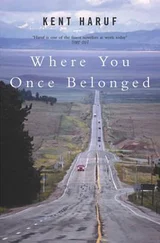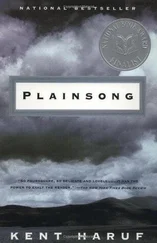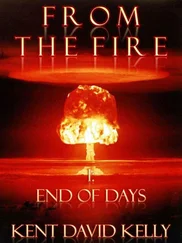Let me have one of those things.
You want to smoke?
I like the smell of it. I can still smell it.
She stood and shook out a cigarette from the pack and he took it in his thick fingers and she bent and lit it for him, his face illuminated now for a moment, pale and thin, his cheeks drawn in, his eyes sunken. He puffed at the cigarette and blew out and looked at the end of it. Lorraine sat back down. Mary came out on the porch and stopped, looking at Dad.
What are you doing?
Nothing.
Oh don’t give him one of those things. He doesn’t need something more to make him worse.
What can it hurt, Mom? Come sit down.
I’m just holding it, Dad said.
You’re both foolish, Mary said. She seated herself and after a while she and her daughter began to move the swing.
Do you remember when you caught us smoking in the barn? Lorraine said.
Corrupting your brother, Dad said.
It was my job. I was the big sister.
By three years.
Big enough.
I made you smoke the whole pack afterward.
It was only a couple more cigarettes.
Was it.
But you stood there and made us.
It didn’t do any good. Did it.
No.
How old were you?
I was eleven, Frank was eight. About Alice’s age.
Who’s Alice?
The little girl next door with Berta May.
All right.
Her mother died of breast cancer.
I remember now, Dad said. I know.
Later, when the three of them were still talking, Dad said: You could come back and run the store. You’re already here. You wouldn’t even have to leave. You could stay here and run it.
I don’t know if I want to do that, Daddy.
It’s all in the will, he said. It goes to Mom and then to you after she’s gone. You could learn how. You’re quick and you know how to manage people. You manage people already.
Just four people in the office.
That’s enough. You wouldn’t have to take care of that many here. There’s Rudy and Bob and the bookkeeper. They’ve been with me so long they don’t need much managing.
They’re used to you, Lorraine said. They wouldn’t want somebody new coming in and telling them what to do.
They’d get used to it.
I doubt it.
They’d get used to it. Or else, you’d let them go. You can think about it. Will you do that?
I don’t know, Daddy. We’ll see. What do you think, Mom?
I think it’d be nice to have you here. You could live with me in the house.
We’d make each other unhappy. You know we would.
Well, I don’t either know that, Mary said. You wouldn’t make me unhappy. But you mean what I’d do to you.
I didn’t mean anything, Mom. I’ve just been away for so long.
They looked at Dad. He was staring out into the street past the trees and the fence. Does it hurt you, Daddy, for us to be talking about what will happen after you’re gone?
I don’t want to know all of that. What I want to know about is the store. I want that figured out.
But if I took over, what about Frank?
What do you mean? Frank won’t be coming back.
But what about him? How is he mentioned in the will?
He’s not mentioned.
Why isn’t he?
Because he left.
So did I.
But not like he did. We don’t know where he is or what he’s doing. We don’t know nothing about him no more. We haven’t had contact in years.
I used to hear from him, Lorraine said. He’d call me on the phone at work.
When was this?
When he was still in Denver. Then I didn’t hear from him anymore. I tried to find him but I couldn’t. We used to meet and go out to a bar and talk.
Honey, we know you did that, Mary said. We thought you were talking about something different.
He always wanted to meet at a particular bar downtown. He’d come in as he always did, like he was sick, or hungry. Maybe he was, both. He’d sit down and look around. I’m paying, I’d tell him. Then I’ll have something good, he’d say. We’d smoke and when the drinks came he’d take a long swallow and say, Goddamn. Here’s to happier days, and then he’d start talking.
About what? Dad said.
Oh anything. His work. His friends. What guy he was living with.
We don’t need to hear about that.
I know, Daddy. He was just so sad sometimes and so blue.
He was always sad, Mary said. As he grew older, I mean. Not when he was little.
He’d be drunk by the time we finished for the night. Sometimes he’d get funny too.
What do you mean?
Oh, he could be funny. He had style. He could be really witty. Did you know that?
We never heard much of that here, Dad said.
No. He wouldn’t here. But he could be very funny.
Like how? said Mary.
Oh, just clever. Not telling jokes, I don’t mean that. But talking in a funny entertaining way about different people. About his life. About his friends and the people he worked for.
I suppose he said something about us, Dad said.
He talked about you. About both of you.
What about us?
What his life was like here, Daddy. When he and I were growing up here in Holt.
It was all bad, I suppose.
Not all of it. He had some good things to say too.
Well, I don’t know.
I hope he did, Mary said. She got up and went into the house and brought back a blanket and spread it over Dad. He sat in the chair looking out at the street, the blanket drawn up to his chest.
The millers were swirling under the porch light and bumping it and dropping to the floorboards and fluttering upward again. Mary went back and switched off the light and returned and sat down. The millers still singed themselves against the hot bulb and fell or fluttered away. From beyond Berta May’s house the corner street lamp cast long shadows through the trees that moved a little in the night air.
YEARS AGO Alene walked along a wide Denver sidewalk with her arm in a man’s arm. That was in wintertime. A snowy evening. The snow was falling thickly and it was pleasant under the lights along the street, walking slowly past the city stores, looking in the windows, delaying going back to the hotel for the pleasure of being out in the cold air together. She was a young woman then, just thirty-three, nice-looking and slim and tall and brown haired and blue eyed. He was a little older, closer to forty, a tall man with the gray starting to show at the sides of his head. A principal in a school in the same district as the school she taught in. Which was how and why they met, at a district-wide school meeting. She had felt something at once. And then she had found a way of saying something to him. She couldn’t remember what it had been but it’d made him laugh and then they’d met again at another gathering and he had wanted to know if she would join him for dinner sometime in Denver. They both understood what he was saying. She said yes, she’d like that. And that was when it began.
The snow had started to collect on the sidewalk. The cars were beginning to pack it down out in the street. Going quietly by, quieted by the snow.
At the end of the block they stood waiting for a city bus to pass, the interior illuminated in the evening, the people in the bus moving past them as in a kind of movie. An old woman alone in her seat on the bus. An old man wearing a hat. A young girl at the back looking out the window as the bus passed and went on up the street. They crossed the street, she held on to his arm so as not to misstep.
Are you ready to go up? he said.
Yes. Are you?
Yes.
They turned in at the lobby of the hotel. It was a block east of the train depot, an old hotel, one of the oldest in the city, a tall square redbrick building with an ornate front. She stood near the elevator while he got the key from the desk clerk and they rode up to the third floor, another man with them, and she felt his now familiar hand pressing the side of her hip through her coat and that was something she would remember afterward, the feeling of that and the secret of it, while he and the other man made conversation about the weather. What about this snow? It might go up to a foot. Is that right? That’s what they were saying on the news, if you can believe them, and then the elevator stopped and they got out and walked down the long narrow hall, following the runner tacked to the floor, she in front, he following, and came to the room and she stepped aside so he could open the door with the key.
Читать дальше








